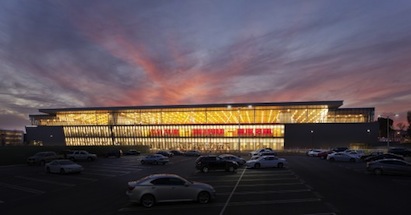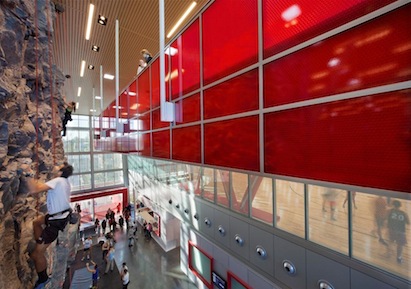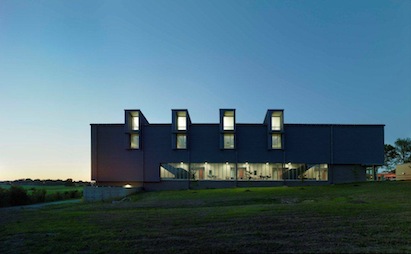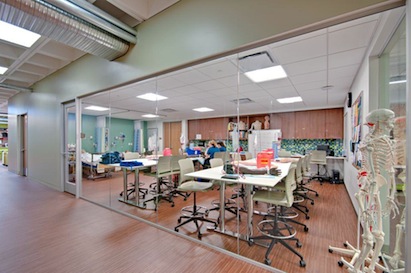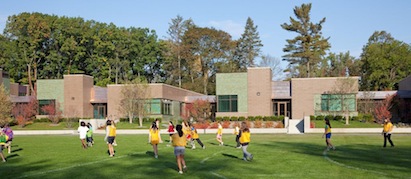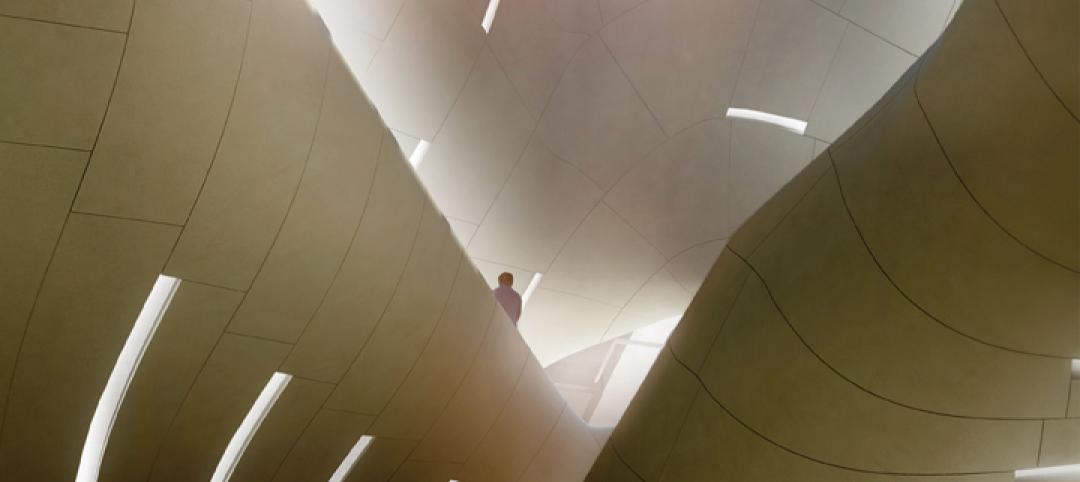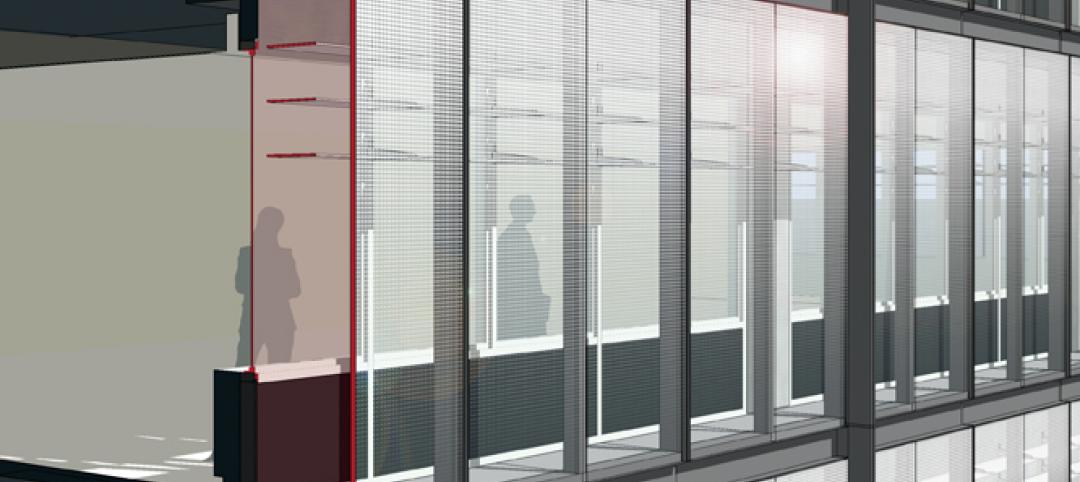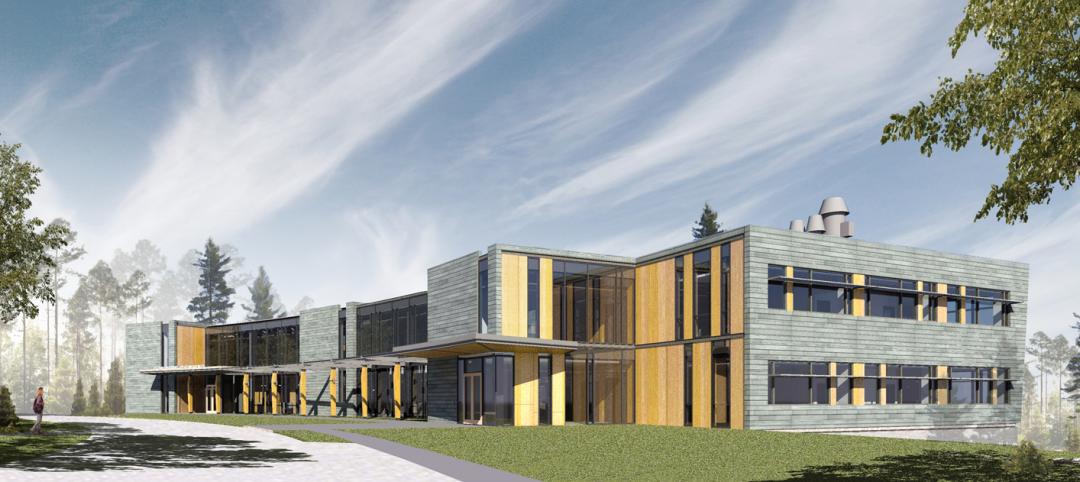Washington, D.C. – The American Institute of Architects (AIA) Committee on Architecture for Education (CAE) has selected five educational and cultural facilities for this year’s CAE Educational Facility Design Awards. The CAE Design Excellence Award honors educational facilities that the jury believes should serve as an example of a superb place in which to learn, furthering the client's mission, goals and educational program while demonstrating excellence in architectural design. These projects exemplify innovation through the client's educational goals through responsive and responsible programming, planning and design. Function and surrounding regional and community context are valued as part of the planning and design process.
California State University, Northridge Student Recreation Center; Northridge, California
LPA, Incorporated
The Student Recreation Center strategically creates a strong bookend to the east end of the campus, providing a dynamic, energetic approach to recreation. The design concept is clearly executed with a judicious use of colors and finishes. Upon entering the building natural lighting and material choices raise excitement and motivate movement. As an athletic building, it captures the energy and impetus of the various sporting activities inside. Strong transparency and interconnections between spaces inside the building are appealing, inviting and conducive to exercising. Compositionally it is assured and confident. Its community connection is highly apparent. Rainwater collection, natural ventilation, and day lighting are strong sustainable design features that are nicely integrated into the design. It was evident to the jury that students were involved in the conceptualization process and planning.
Sandy High School; Sandy, Oregon
Dull Olson Weekes – IBI Group Architects
Breathtakingly detailed as a public school, Sandy High School sets very high standards in terms of materials, finishes and aesthetics. Sitting lightly on the land, the building allows nature to penetrate the campus. It takes advantage of the hillside and creates panoramic views while nestling comfortably on the contours. Visible green roofs below adjacent classrooms add to hillside views while remaining roof areas are opportunities for power generation. Transparency between classrooms and common areas is executed boldly, with floor to ceiling glass suggesting a confidence with the user groups. Single loaded corridors were used to great effect by allowing natural light into both sides of learning spaces. Exterior treatments reflect the region in a wonderful and indigenous way and incorporate pleasant verandas with deep overhangs. The usable space per student and color combinations contribute to and promote student development.
Hinds Community College Jobie L. Martin Classroom Building; Jackson, Mississippi
Duvall Decker Architects
This simple and honest building with strong forms and an elegant façade shows that a few simple gestures can render a sense of identity to an otherwise nondescript campus. The rigorous use of materials, straightforward detailing, and clarity of concept elevates the modest program to a new level. The jury admired the light airy classrooms that combined the translucent, transparent, fixed, and operable glazing.
Mesa Community College Health Wellness Building; Mesa, Arizona
SmithGroupJJR
The transformation of this postindustrial concrete building into a light filled, translucent learning environment is exceptional. This project sets a high standard for reuse and repurposing of an existing building and demonstrates how constraints can benefit and strengthen a project. The conversion of leftover space between buildings creates dynamic and interactive circulation opportunities. The exterior is striking in its bold gestures, especially at night.
Cranbrook Kingswood Girls’ Middle School; Bloomfield Hills, Michigan
Lake|Flato Architects
This design integrates form and function in ways reminiscent of the Crow Island School. The building is indicative of an independent language that fits well within the campus context. Cranbrook Kingswood Girls' Middle School is beautifully detailed, appropriately contextual in a place where expectations are very high, modest in scale, yet intimate. The variety of shared common learning spaces connects directly to the exterior while providing opportunities to integrate imaginative ideas into the educational environment. The scale of the interstitial spaces and classrooms give a very secure feeling to the learning environment. This school builds on great traditions but creates a quality and life of its own.
Jury
The 2013 CAE Educational Facility Design Awards jury includes: Steven M. Shiver, AIA, Chair, NAC Architecture; John R. Dale, FAIA, Harley Ellis Devereaux; Linda Nelson Keane, AIA; Victor Sidy, AIA, Taliesin School of Architecture and C. Kenneth Tanner, University of Georgia.
About the Committee on Architecture for Education (CAE)
The CAE is a large and active group of architects and allied professionals concerned with the quality and design of all types of educational, cultural, and recreational facilities. While a large portion of CAE members practice in the K-12 and post-secondary education markets, they look to serve the needs of those in the entire pre-K to 99 markets. CAE identifies national educational facility issues critical to architects and works to strengthen relationships with allied organizations, client groups, and the public.
About The American Institute of Architects
Founded in 1857, members of the American Institute of Architects consistently work to create more valuable, healthy, secure, and sustainable buildings, neighborhoods, and communities. Through nearly 300 state and local chapters, the AIA advocates for public policies that promote economic vitality and public well being. Members adhere to a code of ethics and conduct to ensure the highest professional standards. The AIA provides members with tools and resources to assist them in their careers and business as well as engaging civic and government leaders, and the public to find solutions to pressing issues facing our communities, institutions, nation and world. Visit www.aia.org.
Related Stories
| Oct 14, 2011
AIA Continuing Education: optimizing moisture protection and air barrier systems
Earn 1.0 AIA/CES learning units by studying this article and passing the online exam.
| Oct 12, 2011
BIM Clarification and Codification in a Louisiana Sports Museum
The Louisiana State Sports Hall of Fame celebrates the sporting past, but it took innovative 3D planning and coordination of the future to deliver its contemporary design.
| Oct 12, 2011
Vertical Transportation Systems Reach New Heights
Elevators and escalators have been re-engineered to help building owners reduce energy consumption and move people more efficiently.
| Oct 12, 2011
Building a Double Wall
An aged federal building gets wrapped in a new double wall glass skin.
Office Buildings | Oct 12, 2011
8 Must-know Trends in Office Fitouts
Office designs are adjusting to dramatic changes in employee work habits. Goodbye, cube farm. Hello, bright, open offices with plenty of collaborative space.
| Oct 12, 2011
FMI’s Construction Outlook: Third Quarter 2011 Report
Construction Market Forecast: The general economy is seeing mixed signs.
| Oct 12, 2011
Bulley & Andrews celebrates 120 years of construction
The family-owned and operated general contractor attributes this significant milestone to the strong foundation built decades ago on honesty, integrity, and service in construction.
| Oct 12, 2011
Consigli Construction breaks ground for Bigelow Laboratory Center for Ocean Health
Consigli to build third phase of 64-acre Ocean Science and Education Campus, design by WBRC Architects , engineers in association with Perkins + Will
| Oct 11, 2011
AIA introduces five new documents for use on sustainable projects
These new documents will be available in the first quarter of 2012 as part of the new AIA Contract Documents service and AIA Documents on Demand.
| Oct 11, 2011
Pink light bulbs donated to Society of Memorial Sloan-Kettering Cancer Center
For every Bulbrite Pink Light Bulb that is purchased through the Cancer Center Thrift Shop, 100% of the proceeds will be donated to help support breast cancer research, education, screening, and treatment.


